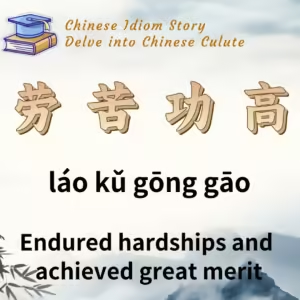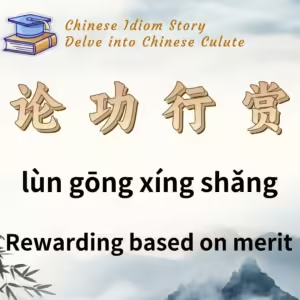
Chinese Idiom: 劳苦功高 (Lao Ku Gong Gao)
English Translation: Endured hardships and achieved great merit
pīn yīn: láo kǔ gōng gāo
Idiom Meaning: This idiom describes someone who has gone through significant hardships and exerted considerable effort, ultimately achieving great accomplishments. It acknowledges the connection between hard work and the rewards that come from it.
Historical Source: Records of the Grand Historian (《史记》) by Sima Qian, specifically in the chapter detailing the life of Xiang Yu (项羽).
Idiom Story:
During the famous Hongmen Banquet, a pivotal moment in Chinese history, the warrior Fan Kuai (樊哙) boldly entered the banquet hall where Xiang Yu was hosting a feast. Upon his arrival, Xiang Yu praised Fan Kuai as a “brave man” and offered him wine along with a leg of pork. In response, Fan Kuai placed the pork on a shield and began to eat while drawing his sword.
When Xiang Yu asked if he could still drink, Fan Kuai took the opportunity to reprimand Xiang Yu fiercely, saying:
“I would not shy away from death, so how can a cup of wine deter me? The King of Qin has a heart as fierce as a tiger; he kills without mercy and punishes without restraint, making the whole world turn against him. The King Huai once promised all generals: ‘Whoever first breaks through and enters Xianyang will be king.’ Now, Peng Gong has already broken through the Qin forces and entered Xianyang, and he has not taken even a hair’s breadth of what belongs to the palace; he has sealed the palace and returned to Ba. As for the soldiers guarding the pass, they are there to guard against thieves and unexpected events. Such labor and great merit have gone unrewarded, and you listen to the slanders of the petty men and seek to execute those who have accomplished great deeds. This is akin to continuing the path of the fallen Qin dynasty; I advise you against this!”
In essence, Fan Kuai emphasized that he was unafraid of death, and thus a mere cup of wine was insignificant. He highlighted the betrayal of true merit by advocating for the execution of loyal and accomplished individuals, drawing parallels to the tyrannical rule of the Qin.
Xiang Yu, realizing the validity of Fan Kuai’s arguments, chose not to respond and instead invited him to sit down, easing the tension in the room. This moment allowed Liu Bang (刘邦) to escape a potentially dangerous situation.
The phrase “劳苦而功高如此” was later simplified and became the idiom “劳苦功高.” This expression is now commonly used to recognize and commend those who have worked hard and achieved significant success despite facing difficulties.






